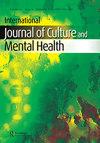Associated factors with major depression: a path analysis on NHANES 2013–2014 study
Q1 Social Sciences
International Journal of Culture and Mental Health
Pub Date : 2018-10-02
DOI:10.1080/17542863.2018.1563623
引用次数: 4
Abstract
ABSTRACT Depression is a common mental disorder. The purpose of this study was to survey the direct and indirect effects of associated factors with major depression (MD) among the population aged 18 years and older of the NHANES 2013–2014. The study was based on a sample of the National Health and Nutrition Examination Survey data, including 5393 people. To detect MD, the Patient Health Questionnaire (PHQ-9) was used. Path analysis with Mplus software was used to perform analyses. The prevalence of MD was 6.9% in men and 12.4% in women. The final model was fitted well with sample data (p = 0.00; RMSEA = 0.05; CFI = 0.89; TLI = 0.77; WRMR = 1.93 in men and p = 0.00; RMSEA = 0.05; CFI = 0.92; TLI = 0.86; WRMR = 2.03 in women). Income, body mass index, chronic diseases and sleep disorder in both men and women and HDL cholesterol and drug use only in women have a direct effect on MD. Income, body mass index, smoking, and chronic diseases have an indirect effect on MD. Sleep disorder has the greatest total effect on MD. It is necessary to pay attention to these effective factors in control of major depression.重度抑郁症相关因素:NHANES 2013-2014研究的路径分析
抑郁症是一种常见的精神障碍。本研究的目的是调查NHANES 2013-2014中18岁及以上人群中与重度抑郁症(MD)相关因素的直接和间接影响。这项研究是基于全国健康和营养检查调查数据的样本,其中包括5393人。采用患者健康问卷(PHQ-9)检测MD。采用Mplus软件进行通径分析。男性的MD患病率为6.9%,女性为12.4%。最终模型与样本数据拟合良好(p = 0.00;rmsea = 0.05;cfi = 0.89;tli = 0.77;男性WRMR = 1.93, p = 0.00;rmsea = 0.05;cfi = 0.92;tli = 0.86;女性WRMR = 2.03)。收入、体重指数、慢性疾病和睡眠障碍对男性和女性都有直接影响,只有女性的高密度脂蛋白胆固醇和药物使用对MD有间接影响,收入、体重指数、吸烟和慢性疾病对MD有间接影响,睡眠障碍对MD的总影响最大,在控制重度抑郁症时需要注意这些有效因素。
本文章由计算机程序翻译,如有差异,请以英文原文为准。
求助全文
约1分钟内获得全文
求助全文
来源期刊

International Journal of Culture and Mental Health
Social Sciences-Cultural Studies
CiteScore
2.10
自引率
0.00%
发文量
0
期刊介绍:
This title has ceased (2018). This important peer-review journal provides an innovative forum, both international and multidisciplinary, for addressing cross-cultural issues and mental health. Culture as it comes to bear on mental health is a rapidly expanding area of inquiry and research within psychiatry and psychology, and other related fields such as social work, with important implications for practice in the global context. The journal is an essential resource for health care professionals working in the field of cross-cultural mental health.Readership includes psychiatrists, psychologists, medical anthropologists, medical sociologists, psychiatric nurses and social workers, general practitioners and other mental health professionals interested in the area. The International Journal of Culture and Mental Health publishes original empirical research, review papers and theoretical articles in the fields of cross-cultural psychiatry and psychology. Contributions from the fields of medical anthropology and medical sociology are particularly welcome. A continuing dialogue between members of various disciplines in various fields is encouraged. The aim of the journal is to encourage its readers to think about various issues which have clouded cross-cultural development of ideas. The journal lays special emphasis on developing further links between medical anthropology, medical sociology, clinical psychiatry and psychology, and implications of the findings on service provisions. The journal is published four times a year. The style of reference is Harvard. All research articles in this journal, including those in special issues, special sections or supplements, have undergone rigorous peer review, based on initial editor screening and anonymized refereeing by at least two independent referees.
 求助内容:
求助内容: 应助结果提醒方式:
应助结果提醒方式:


